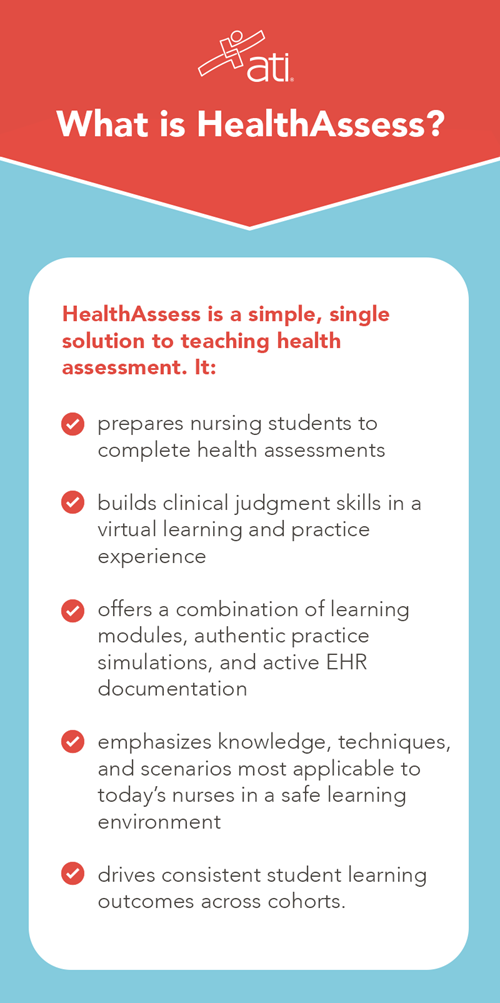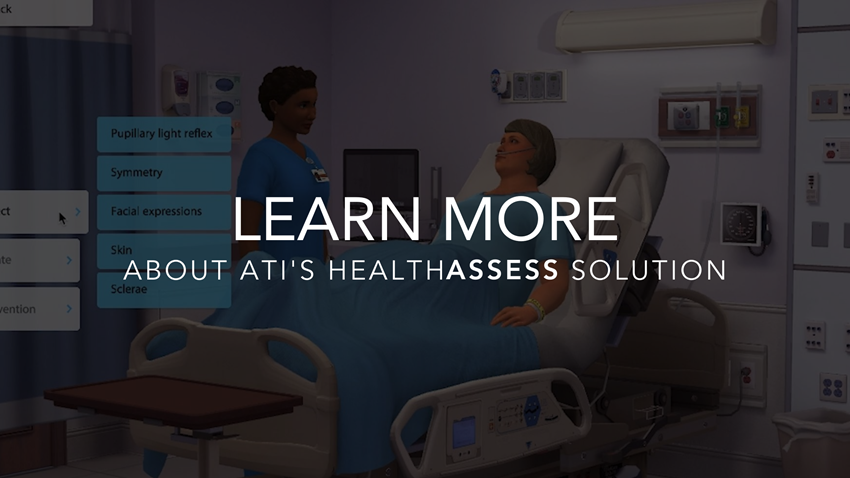How 1 college proved the value of virtual nursing health assessment
Virtual nursing health assessment practice = Evidence-based, statistically significant benefits
Research into virtual nursing health assessment might seem most appropriate at a major university’s school of nursing. But the small campus of the Jefferson College Bi-Level Nursing Program (Hillsboro, Mo.) has proven to be the perfect testing ground. A survey of this community college’s nursing students who used ATI’s HealthAssess solution showed just how impactful this online, virtual, practice-based product can be in helping prepare them to perform nursing health assessments on diverse clients. Plus, they learn to assess key body systems while building clinical judgment skills.
Discovering the multiple benefits of HealthAssess, a virtual nursing health assessment
Jefferson College’s nursing program began using HealthAssess in early 2021 to supplement its clinical assignments. In fall 2021, the school began using it in Fundamentals didactic for teaching head-to-toe assessments.
The reaction from students was a big thumbs up.
 Sarah Akridge, MSN-Ed, RN, Assistant Professor/PN Coordinator at Jefferson, says students value HealthAssess as an “exceptional resource” in providing system-assessment videos and explanations to improve their cognitive and tactile learning.
Sarah Akridge, MSN-Ed, RN, Assistant Professor/PN Coordinator at Jefferson, says students value HealthAssess as an “exceptional resource” in providing system-assessment videos and explanations to improve their cognitive and tactile learning.
“The students love being able to read a short blurb about the skill/system assessment and then watch an immediate demonstration of that [assessment] in the video,” she adds.
But HealthAssess isn’t simply an entertaining tool. It was designed specifically to eliminate nonessential assessment skills from lessons via a virtual nursing health assessment solution. A paper written by two ATI Nurse Educators, “Changing the way we teach health assessment,” supports the importance of that goal. The paper noted, “There is little to no research that supports the decisions nurse educators are making regarding the essential health assessment components needed for comprehensive evaluation of any patient or which assessment skills can be omitted from the curriculum.”
The paper explained that “eliminating nonessential assessment skills from the course could allow students to spend more time focusing on the essential assessment skills that are required to safely care for patients in the various settings of nurses’ work.”
Limiting lessons to essential nursing health assessment skills is a big plus for students feeling overwhelmed by the extra studying required in nursing school. Specifically, Clinical Coordinator Maggie Rola, BSN, RN, CPN, says that HealthAssess gives students “more time to actually practice the skill instead of spending time searching other platforms for reference material.”
Plus, she adds, “The virtual simulations are extremely beneficial for our clinical assignments. These simulations help supplement what is being taught in didactic and seen in the clinical setting. It is a fantastic teaching solution that helps engage the students with an interactive module to master their health assessment skills.”
An even bigger benefit to focusing on need-to-know skills? Research shows that using essential nursing health assessment skills when encountering or caring for a patient improves a nurse’s ability to observe and recognize subtle cues, interpret or gather additional information or data, and respond to the patient’s healthcare needs1.
Rola is encouraged by her students’ knowledge of those essential skills. After using HealthAssess, she says, “Student feedback and improved comfort with the skill of head-to-toe assessments has seemed to improve.” In fact, a survey by ATI confirmed Rola’s evaluation of her students’ skills. In several areas, those skills had definitively improved.
Researchers dig in and review students’ skills in nursing health assessments
 ATI researchers assessed a sample (N = 43) of Jefferson College’s practical nursing students using HealthAssess. The students received a combination of nursing health assessment learning modules that included practice simulations, virtual demonstrations, end-of-module practice tests, and media-rich tutorials. The research team assessed the students before and after completion of each module on their self-efficacy and preparedness to perform focused client health assessments.
ATI researchers assessed a sample (N = 43) of Jefferson College’s practical nursing students using HealthAssess. The students received a combination of nursing health assessment learning modules that included practice simulations, virtual demonstrations, end-of-module practice tests, and media-rich tutorials. The research team assessed the students before and after completion of each module on their self-efficacy and preparedness to perform focused client health assessments.
The results backed up the solution’s purpose and showed statistically significant increases (p<.001) in both confidence and preparedness in six areas:
- performing nursing health assessments
- determining the right tools needed to perform an assessment and how to correctly use them
- differentiating between expected and unexpected findings
- eliciting information using open-ended questions
- engaging in collaborative conversations with the client's healthcare team
- entering data into the EHR (p < .01).
Students said they were thoroughly satisfied with the training. One hundred percent rated HealthAssess from “good” to “excellent,” and 96 percent reported that the preparation provided relevant client examples. More than 90 percent reported an increase in empathy after completing the modules.
The results reinforce that HealthAssess modules provide a single teaching solution offering authentic practice simulations that improve students' self-efficacy and preparedness. Both attitudinal constructs are drawn from major theories of motivation that can translate into the practice setting.
Additional benefits that ease faculty’s workload
Any resource that improves learning while also easing faculty’s workload offers added value. At Jefferson, Akridge says HealthAssess has provided faculty with “consistency in assignment utilization for supplemental clinical assignments,” adding, “It has streamlined the process for providing the students with real-life clinical scenarios that they previously wouldn’t have had access to.”
Additionally, she says, “Health Assess has saved us a lot of time when creating clinical assignments because everything is ready to go! It has eliminated the need for the traditional case study-type assignment and given us the opportunity to expand on the students' clinical judgment skills.”
As a nursing health assessment product, HealthAssess also provides the opportunity for students to build their clinical judgment through simulated scenarios and cases. “This platform is a great supplement for in-person clinical and helps to build upon the material covered in lecture,” Akridge adds.
Rola called HealthAssess “the most well-rounded product.” “It allows students the feeling of hands-on skills in addition to exceptional rationales on why those skills are being performed,” she says. She’s especially complimentary of ATI’s use of real people in videos, calling them “invaluable to students.”
An overall view of Jefferson’s success
Akridge says Jefferson uses many different aspects of ATI solutions, including Skills Modules, Video Case Studies, Engage Fundamentals, and proctored standardized assessments.
“We are actively working to ensure we utilize the ATI solutions in all of our courses because we have seen improved student outcomes with the implementation of ATI,” she explains.
How much have student outcomes improved? “Our pass rates have been stellar!” Akridge says. In 2018, NCLEX-PN pass rates were 97.63 percent, while NCLEX-RN pass rates were 78.79 percent. “Our current 2022 NCLEX-PN pass rate is 100 percent,” Akridge says, “and our current 2022 NCLEX-RN pass rate is 94.6 percent.”
1Zambas, S. I., Smythe, E. A., & Kozoil-McLain, J. (2016). The consequences of using advanced physical assessment skills in medical and surgical nursing: A hermeneutic pragmatic study. International Journal of Qualitative Studies on Health and Well-being, 11(Sep 6). doi: 10.3402/qhw.v11.32090. Retrieved from https://www.ncbi.nlm.nih.gov/pmc/articles/PMC5015639/
What is HealthAssess?
HealthAssess is a simple, single solution to teaching health assessment. It:
- prepares nursing students to complete health assessments
- builds clinical judgment skills in a virtual learning and practice experience
- ·offers a combination of learning modules, authentic practice simulations, and active EHR documentation
- emphasizes knowledge, techniques, and scenarios most applicable to today’s nurses in a safe learning environment
- drives consistent student learning outcomes across cohorts.

